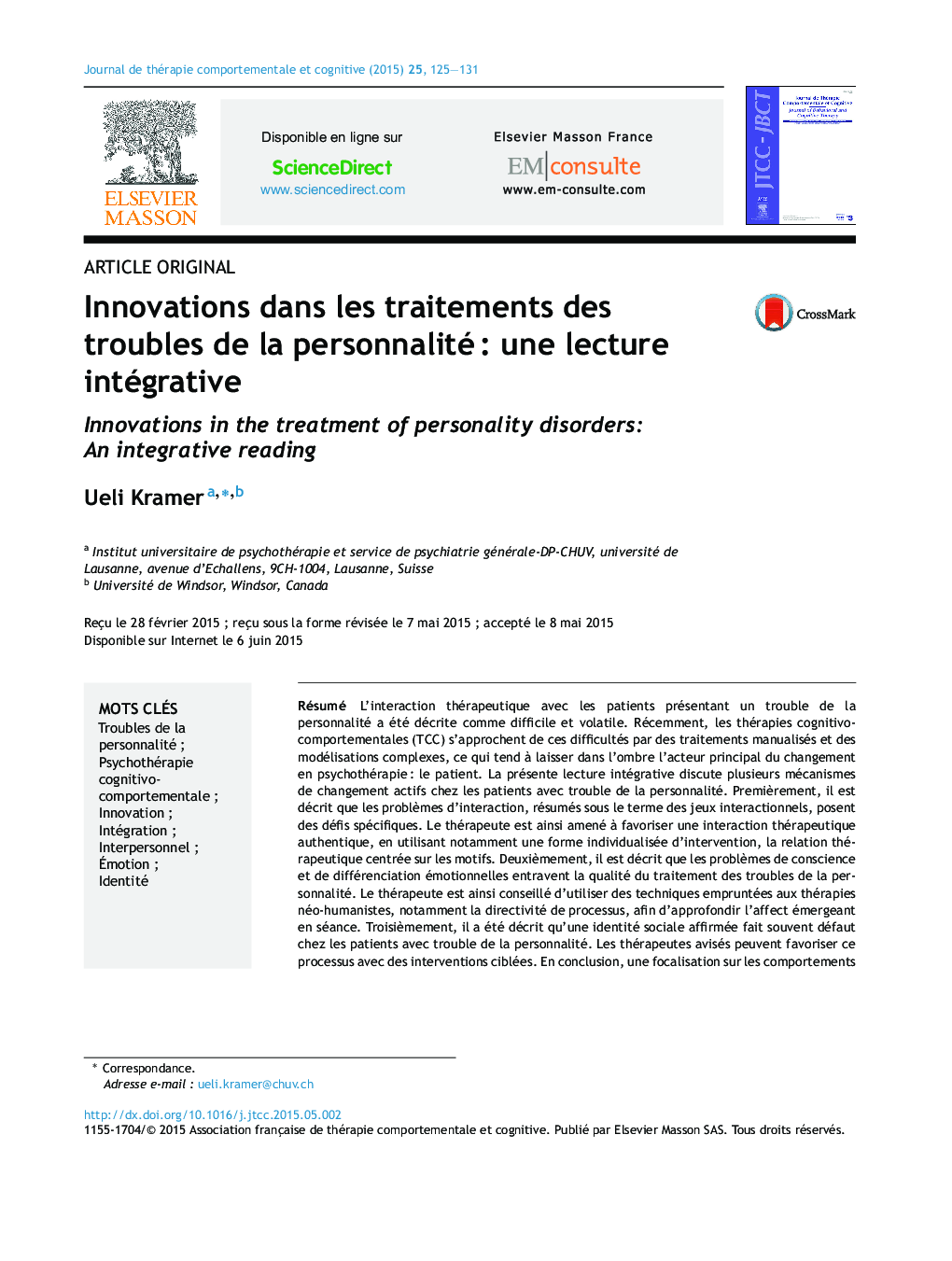| کد مقاله | کد نشریه | سال انتشار | مقاله انگلیسی | نسخه تمام متن |
|---|---|---|---|---|
| 934703 | 923692 | 2015 | 7 صفحه PDF | دانلود رایگان |
عنوان انگلیسی مقاله ISI
Innovations dans les traitements des troubles de la personnalité : une lecture intégrative
دانلود مقاله + سفارش ترجمه
دانلود مقاله ISI انگلیسی
رایگان برای ایرانیان
موضوعات مرتبط
علوم پزشکی و سلامت
پزشکی و دندانپزشکی
روانپزشکی و بهداشت روانی
پیش نمایش صفحه اول مقاله

چکیده انگلیسی
Therapeutic interaction with patients presenting a personality disorder is described as difficult and volatile. In recent years, cognitive-behavioral therapies (CBT) have approached these difficulties by formalizing treatment manuals and by proposing complex cognitive maps and models. While this endeavor is important and accurate for a number of treatments, these models tend to ignore the central actor of change in psychotherapy: the individual patient. In this present paper a number of mechanisms of change which are central to treatments of patients with personality disorders are discussed. A radically scientifically inductive stance has been adopted: the observed interactional behavior of the patient is taken as the starting point in understanding the actual processes of change. This contrasts with complex models trying to explain the clinical phenomena and fundamentally failing to do so on an idiosyncratic level. In addition, it is demonstrated how the paradox of equivalence extends to bona fide psychological treatments for personality disorders, by discussing problems inherent in studies aimed at demonstrating the superiority of a specific therapy model. This argument further supports emerging scientific interest in mechanisms of change in treatments of personality disorders. Three patient-related processes are considered. Firstly, patients with personality disorders present interactional problems, sometimes summarized as interactional maneuvers (or games), which create specific therapeutic challenges. For example, these patients may tend to criticize the therapist, cross borders and use suicide threats in order to obtain interpersonal recognition. To be able to productively use the relationship aspects inherent in these interactional behaviors, the therapist needs a fine-tuned perception of which elements are part of an authentic interaction and which ones are not. This differentiated understanding helps the therapist develop interactions which foster authentic exchanges, for example by using the motive-oriented therapeutic relationship, based on individualized case formulations. The literature also explains that problems related to the patient's awareness and differentiation of emotions may impede the quality of the treatment in the area of personality disorders. If this is the case, a detailed process assessment of these emotional problems should be made. As a result, the therapist may implement techniques based on emotion-focused principles, for example by using process-directivity. Process-directivity helps the patient to work on affectively charged contents in the here and now of the therapeutic interaction; it does not imply that the therapist makes suggestions related to the content of the processing, but rather helps optimize the course, quality and depth of emotional processing. In addition, techniques of affect and techniques to deepen understanding may be used when appropriate. Finally, patients with personality disorders suffer from difficulties in affirming strong social identities. Again, the first step is the accurate assessment of these problems by the therapist. Then, the therapist may foster this process by using appropriate interventions aimed at developing aspects of social identity, for example fostering assertive anger in the patient might be a useful process leading to stronger identities in social contexts. In conclusion, focusing on the actual observable patient behaviors - the real processes going on in the therapy hour - is productive. It may allow the therapist to refine, precise and deepen their case formulation and intervention which in turn is then more closely related to the patient's processes.
ناشر
Database: Elsevier - ScienceDirect (ساینس دایرکت)
Journal: Journal de Thérapie Comportementale et Cognitive - Volume 25, Issue 3, September 2015, Pages 125-131
Journal: Journal de Thérapie Comportementale et Cognitive - Volume 25, Issue 3, September 2015, Pages 125-131
نویسندگان
Ueli Kramer,